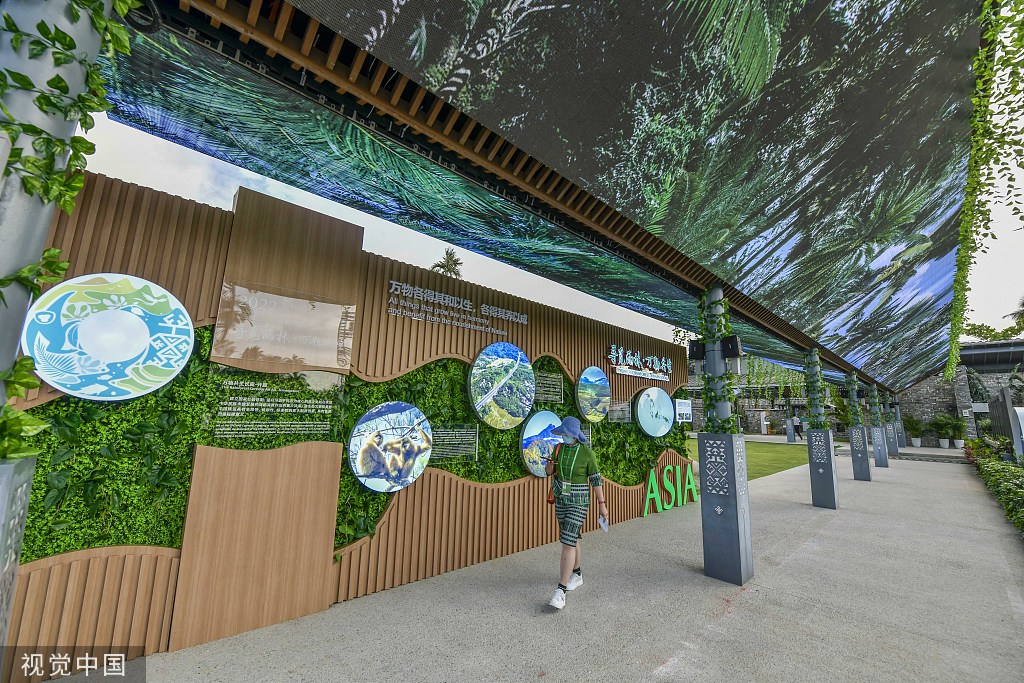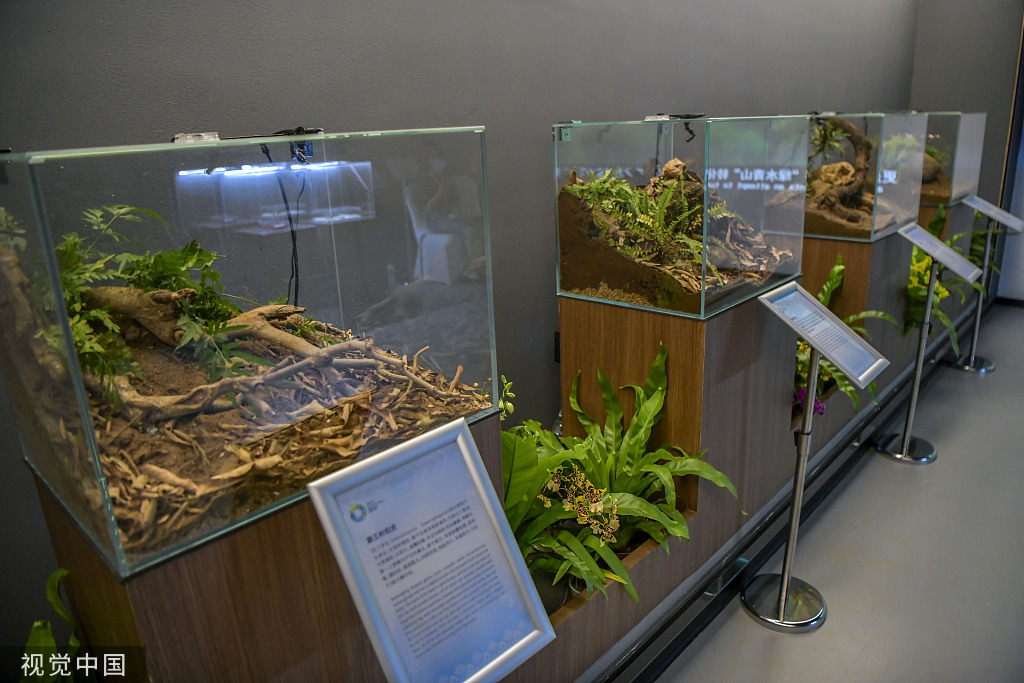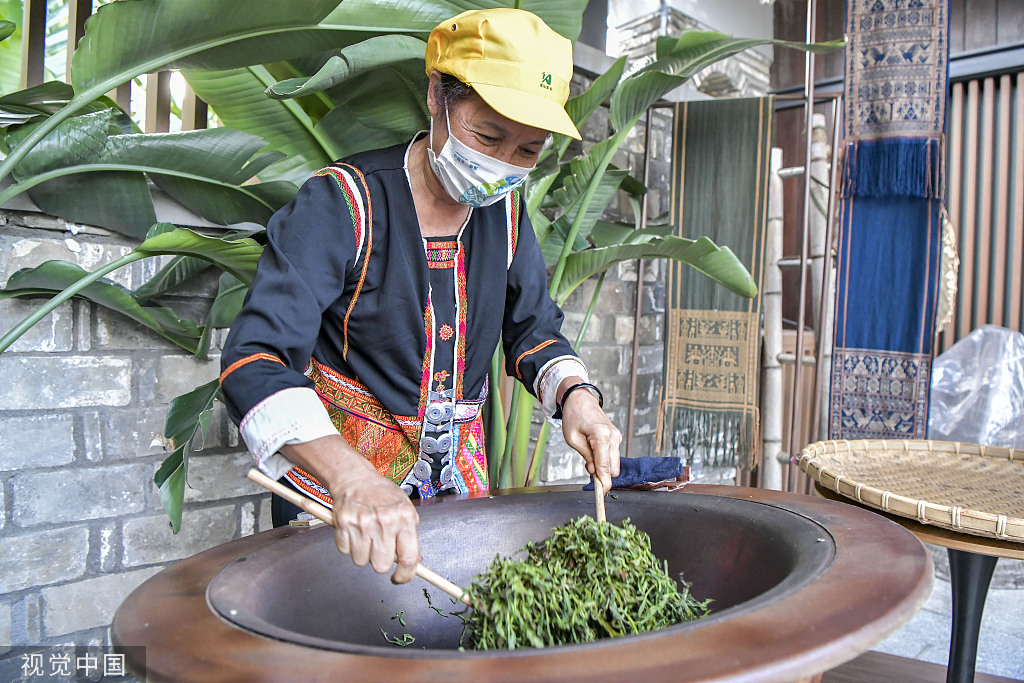

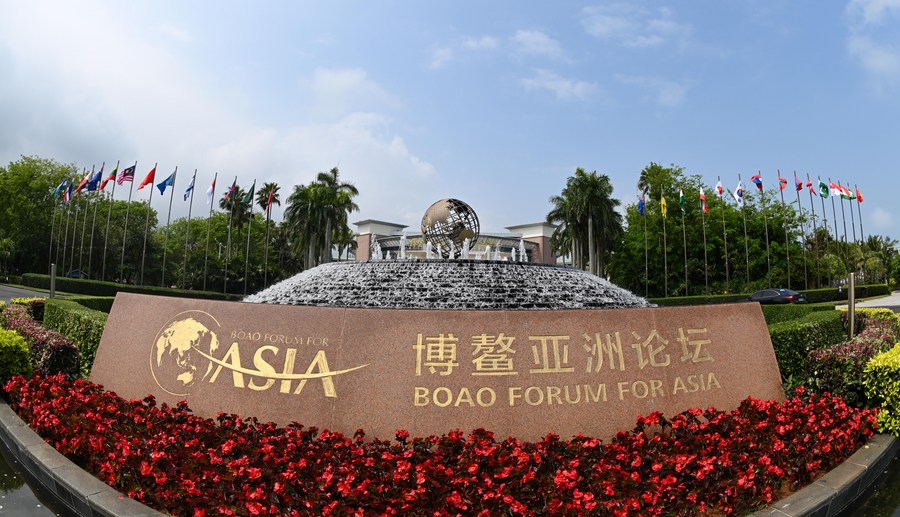
The Boao Forum for Asia Annual Conference 2023 will be held from March 28 to 31 in Boao town of Qionghai city, South China's Hainan province, according to an official statement released on Friday.
It said that this year the forum will be held entirely offline.
According to the statement, the forum will include discussions and conferences themed on development and inclusiveness, efficiency and security, regional and global cooperation, as well as discussions on the present and the future, with a view to promoting international cooperation and consolidating consensus.
Heads of international organizations, business leaders and academia will gather in Boao for these discussions.

BEIJING - The Boao Forum for Asia (BFA) Annual Conference 2022 which ended on Friday was closely watched by business runners and scholars worldwide as the global economy desperately needs impetus and certainty.
Many of them stressed the importance of the Boao discussions on Asia and world economy, as well as global challenges, saying the forum helps build consensus and draw a blueprint for global governance on sustainable development.
Andrew Forrest, chairman of Australia's iron ore giant Fortescue Metals Group (FMG), said that Boao provides a vital platform to further strengthen Australia's business and political relationships with Asia, and is also an important element of FMG's engagement with China and the whole Asia.
"FMG's success and that of the Australian economy has been built on the great powerhouse that is Asia. Now, more than ever, these strong trade relationships provide economic stability as we work together to build new opportunities for the future," Forrest said.
Sudheendra Kulkarni, former chairman of Mumbai-based think-tank Observer Research Foundation, said that seeking common ground and common solutions to global problems is "the only way to go forward."
"Unfortunately, Western countries are not grasping the importance of global cooperation, using some pretext or the other ... trying to build hurdles on the path to globalization and global cooperation," he said, adding that to promote growth, the world must accelerate globalization instead of pushing it back.
"Protectionism and unilateralism are negative forces which undermine small economies, hinder their development, and deepen poverty," said Joseph Matthews, senior professor at the BELTEI International University in Phnom Penh.
Matthews added that China's myriad efforts to promote economic development through programs such as the Belt and Road Initiative (BRI) are essential to boost the global economy and free trade.
Cavince Adhere, a Kenya-based international relations scholar, said that cooperation under the BRI has become a road of cooperation, health, recovery and growth for countries along the routes.
In Kenya, the BRI projects have provided local people with jobs despite the economic hardship caused by the COVID-19 pandemic, Adhere added.
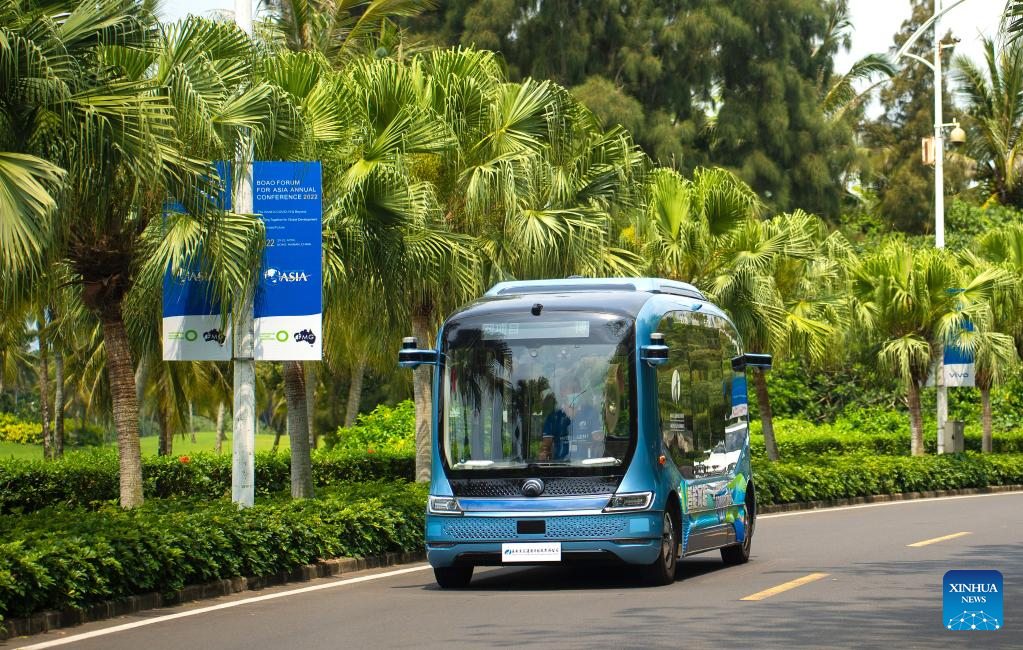
Boao event told of how infrastructure projects are transforming economies
Projects carried out under the Belt and Road Initiative have greatly benefited the participating countries and helped them withstand the pandemic's impact, say overseas officials and entrepreneurs who are calling for intensified international cooperation.
The China-proposed BRI has become one of the biggest international cooperation programs, boosting the fortunes of many countries, and it has great potential for further development, former Slovenian president Danilo Turk said on Thursday.
Turk made the remarks at a sub-forum of the Boao Forum for Asia, an annual conference held in China's Hainan province. The sub-forum also drew participation from speakers online.
Kairat Torebayev, Kazakhstan's vice-minister of trade and integration, said that the BRI has resulted in win-win cooperation.
With the implementation of the BRI in Kazakhstan, infrastructure development has gained a boost with the increased investment in railways, roads and ports. The projects will enhance the country's role as a regional trade center and bridge between Asia and Europe, Torebayev said.
Many other countries involved in the BRI also have the potential to promote further cooperation, including in infrastructure and trade, said Torebayev.
Viengsavath Siphandone, Laos' minister of public works and transports, said the impact of the pandemic has heightened the need for major projects such as the China-Laos Railway to spur economic growth, the minister said.
The cross-border railway, connecting Kunming in China's Yunnan province with the Laotian capital Vientiane, opened in December. At more than 1,000 kilometers, the landmark BRI railway carried more than 280,000 metric tons of international cargo within 100 days of its start.
Improving outlook
Former Pakistani prime minister Shaukat Aziz said Pakistan has been actively participating in the BRI, with the associated infrastructure projects greatly changing the fortunes of many places.
He expressed the hope that China and Pakistan will conduct more intensified cooperation in the BRI and other programs to facilitate infrastructure development and boost employment and economic prosperity in the country.
Vincent Lo Hong-shui, chairman of Hong Kong-based property developer Shui On, said the world is facing severe challenges now but the BRI provides a good channel for international cooperation.
"With abundant capital, we need to find investment destinations, and countries involved in the BRI should be a priority," he said.
China has signed more than 200 BRI cooperation agreements with 149 countries and 32 international organizations since 2013, when the initiative was proposed, according to China's National Development and Reform Commission.
Trade between China and countries involved in the BRI has grown despite the impact of the pandemic. Bilateral trade between China and these countries exceeded $11 trillion last year, an increase of more than 23 percent compared with the previous year, according to China's General Administration of Customs.

The emerging metaverse technologies are expected to be integrated into a wide range of sectors including industry, agriculture, manufacturing, retail and consumption, and will fundamentally change the way people work and interact in their daily lives, experts and business executives said on Friday.
Denis Depoux, global managing director at Roland Berger, told a metaverse forum during the Boao Forum for Asia Annual Conference 2022 that the metaverse will help to strongly accelerate industrial modernization and industrial digitalization.
The new concept of the metaverse refers to a shared virtual world in which people can interact via various forms of virtual technology, such as virtual reality and augmented reality.
Du Lan, senior vice-president of the Chinese artificial intelligence pioneer iFlytek, said the combined physical and virtual reality internet will fundamentally change how people work and interact. For instance, the virtual worlds of the metaverse will offer an alternative for farmers to monitor the health of their crops and formulate crop management plans. The industrial metaverse will also offer an excellent alternative for manufacturers to test their products.
While China has its unique advantage in the development of the metaverse including a solid foundation of big data, abundant human resources, developed industrial chains of hardware manufacturing and rich culture, the country needs to ramp up efforts to close the technological gap with developed countries in fields such as chips, operating systems and optical displays.
Max Yuan, chairman and CEO of Xiao-i Corporation, a leading AI technology company based in Shanghai, noted that 2022 marks the year of the metaverse, saying the metaverse will enter a stage of rapid development in the next one to three years.
Looking ahead, he said the metaverse technologies will be integrated into various sectors such as agriculture and manufacturing.

Carbon neutrality signifies an economic and social transformation at the systemic level through green and low-carbon energy development, business executives and experts said on Friday.
So, more efforts are needed to promote synergy and complementarity of various energy sources and accelerate the integrated development of energy with sectors like construction and transportation and drive the digital transformation of energy, they said at the Boao Forum for Asia Annual Conference 2022, held from Wednesday to Friday.
Citing China's ambitious twin goals of peaking carbon emissions before 2030 and achieving carbon neutrality before 2060, Song Hailiang, chairman of China Energy Engineering Group Co Ltd, said the key to success lies in the green and low-carbon development of the energy sector.
To address the challenge of global climate change, more than 130 countries and regions have proposed the goal of carbon neutrality, with focus on green, low-carbon and sustainable development.
Against that backdrop, technology research and service management in the energy sector need to be built on three dimensions-sharing, green and digital economy, Song said.
Liu Jizhen, an academician at the Chinese Academy of Engineering, emphasized that energy integration also means giving full play to the advantages of both traditional and new energy channels, making them support people's lives in a reliable, safe and effective way.
"Although new energy formats like wind and solar power produce low carbon emissions, they have some obvious drawbacks like intermittency, volatility, and inconsistency. Social energy supplies require stability, controllability and adjustability," said Xiang Haiping, chief engineer of the National Energy Administration.
The process of decarbonization cannot be simply described as "the elimination of one and the increase of the other"; rather, it deeply integrates the new and traditional power fields into an optimized combination, Xiang said.
"Gradual phasing out of traditional energy needs to be a long-term endeavor, and it should be based on the safe and reliable replacement of new energy."
In the transportation and construction sectors, energy integration spawned potential development opportunities like hydrogen fuel-cell vehicles, roadside charging pillars and rooftop photovoltaic panels.
To push forward energy integration development to a higher level, market mechanisms play a vital role, Xiang said.
"We should make greater use of market mechanisms, to speed up construction of the green electricity market, build up an emission rights trading system and promote low-carbon consumption," he said.
Liu Qiao, dean of the Guanghua School of Management at Peking University, highlighted the importance of fostering green and low-carbon development, saying the investment in fields related to reaching the carbon peak will create new economic growth points.
Citing China's solid steps to transition from a stage of high-speed development to a new phase of high-quality development, Xie An, leading partner of Deloitte China for climate and sustainability, said the industrial upgrade and transformation are key to fostering high-quality development, and the green development will provide a strong driving force for upgrading industry, increasing enterprise competitiveness and creating new growth opportunities.
More efforts should be made to develop fields related to energy conservation and environmental protection, utilize new technologies to transform and upgrade energy-intensive traditional industries and increase policy support for industrial upgrades, Xie said.
Li Jiaying contributed to this story.
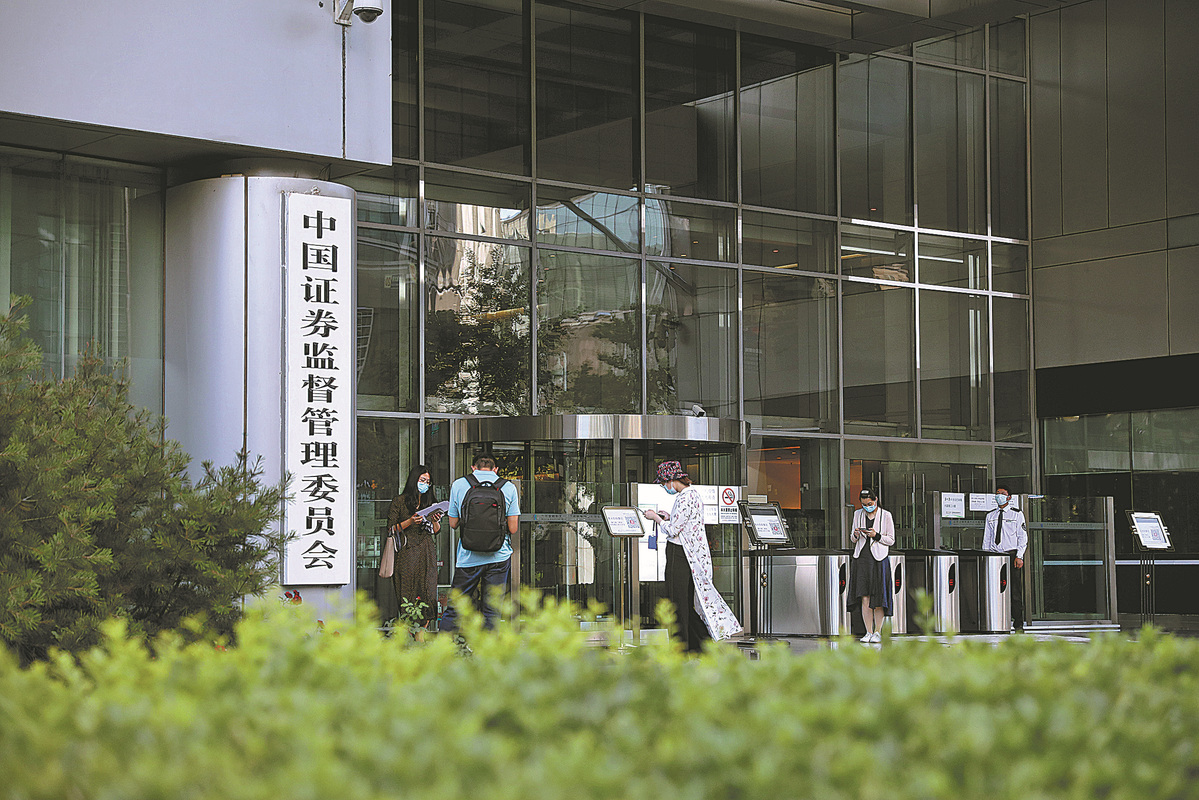
17 more Chinese firms face action; CSRC hints at allowing inspections
Negotiations between Chinese and US regulators over audit issues involving US-listed Chinese companies have proceeded smoothly so far and a cooperation agreement appears possible, said Fang Xinghai, vice-chairman of the China Securities Regulatory Commission, on Thursday night.
Fang made the remarks to the Boao Forum for Asia Annual Conference 2022. The Chinese delegation led by the CSRC has participated in video conferences with the US side on a weekly basis to finalize more details.
As part of the anticipated cooperation agreement, the Public Company Accounting Oversight Board, the organization overseeing the audits of US-listed companies, will be able to conduct inspections in China of Chinese accounting firms that audit US-listed Chinese companies. Any such inspections would be reasonable, rational and legal, said Fang.
Uncertainties over the US-listed Chinese companies, which squeezed their share prices over the past few months, may end soon, he said.
Meanwhile, another 17 US-listed Chinese companies were identified by the US Securities and Exchange Commission on Thursday for failing to meet the audit requirements under the Holding Foreign Companies Accountable Act. Companies including housing services provider KE Holdings Inc, electric vehicle maker Li Auto and courier company BEST Inc will have to provide evidence to the contrary before May 12. Otherwise, they will be delisted from the US exchanges in early 2024.
This is the fifth batch of US-listed Chinese companies facing delisting risk since early March. So far, 40 Chinese companies have been identified under the HFCAA. And 11 companies have already entered the "conclusive list" since they could not submit proof before the SEC's deadline. It means that industry giants such as restaurant chain Yum China Holdings Inc and technology giant Baidu Inc will likely have to wave goodbye to the US exchanges in 2024.
The HFCAA was passed in late 2020. Market mavens in China believe the law has been mainly used to prevent Chinese mainland companies from listing on US exchanges if they have not complied with the PCAOB's audit requirements for three consecutive years. Data from the public domain show that there are 323 US-listed Chinese companies at present.
Chinese regulators' stand on US-listed Chinese companies has been firm. During a meeting held on March 16 by the Financial Stability and Development Committee under the State Council, China's Cabinet, Vice-Premier Liu He said that China is dedicated to reaching a cooperation agreement with US regulators and positive progress can be expected. Chinese companies are still supported to go public in overseas markets, he said.
In general, China will continue its high-level opening-up of the capital market, Fang said on Thursday.
Continued efforts will be made to attract more foreign capital into the onshore stock, futures and bond markets. More international financial institutions should be introduced in China to provide better services to investors, he said.
There will be substantial net inflows of foreign capital into the Chinese capital market this year, said Fang. China's economic resilience, development potential and humongous market size will lead to sustained economic growth, which will help attract more foreign capital and financial institutions, he said.
Data from the CSRC showed that the A-share market attracted total net foreign capital inflows of 887.4 billion yuan ($136.8 billion) from 2019 to 2021. Up to 12 overseas securities, fund and futures companies have picked up holding stakes in the Chinese onshore licensed financial joint ventures.

A group of new national parks will be established this year in key ecological regions around China to boost sustainable development and provide more public eco-products for a shared community of mankind, a senior official with the national forestry authority said on Thursday.
Regions that hold important ecological functions, including the Qinghai-Tibet Plateau, the Yellow River and the Yangtze River watersheds, will be home to the emerging new national parks, said Li Chunliang, vice-minister of the National Forestry and Grassland Administration.
China will identify about 50 national park candidate areas to select from, and the national parks are expected to form the largest system of their kind in the world, said Li, while addressing a sub-forum that discussed the role of national parks in safeguarding harmony between man and nature at the 2022 Boao Forum for Asia Annual Conference, which closed on Friday.
The total area of the candidate national parks are projected to cover 10 percent of China's 9.6 million square kilometers of land area, which contain the country's most characteristic ecosystems and 80 percent of the wild animals and plants under key national protection.
China announced its first group of national parks at the 15th Meeting of the Conference of Parties to the Convention on Biological Diversity held in Kunming, southwestern Yunnan province, last year. They are the Sanjiangyuan National Park, the Giant Panda National Park, the Northeast China Tiger and Leopard National Park, the Hainan Tropical Rainforest National Park and the Wuyi Mountain National Park.
Li said national parks have become attractive "business cards" for displaying the beauty and charm of China's nature and culture. A set of administrative procedures will be released soon to ensure sound and effective construction of national parks.
"Biodiversity is the living fabric of our planet. It underpins ecosystem functioning and the provision of ecosystem services essential for human well-being, and its rapid decline threatens nature and people alike," Shahbaz Khan, director of UNESCO Beijing Office, said at forum.
Khan said UNESCO highly values China's sustainable actions in protecting its heritage, its cultural and biological diversity, and efforts in fulfilling its vision of eco-civilization and supporting the broad mandate of UNESCO.
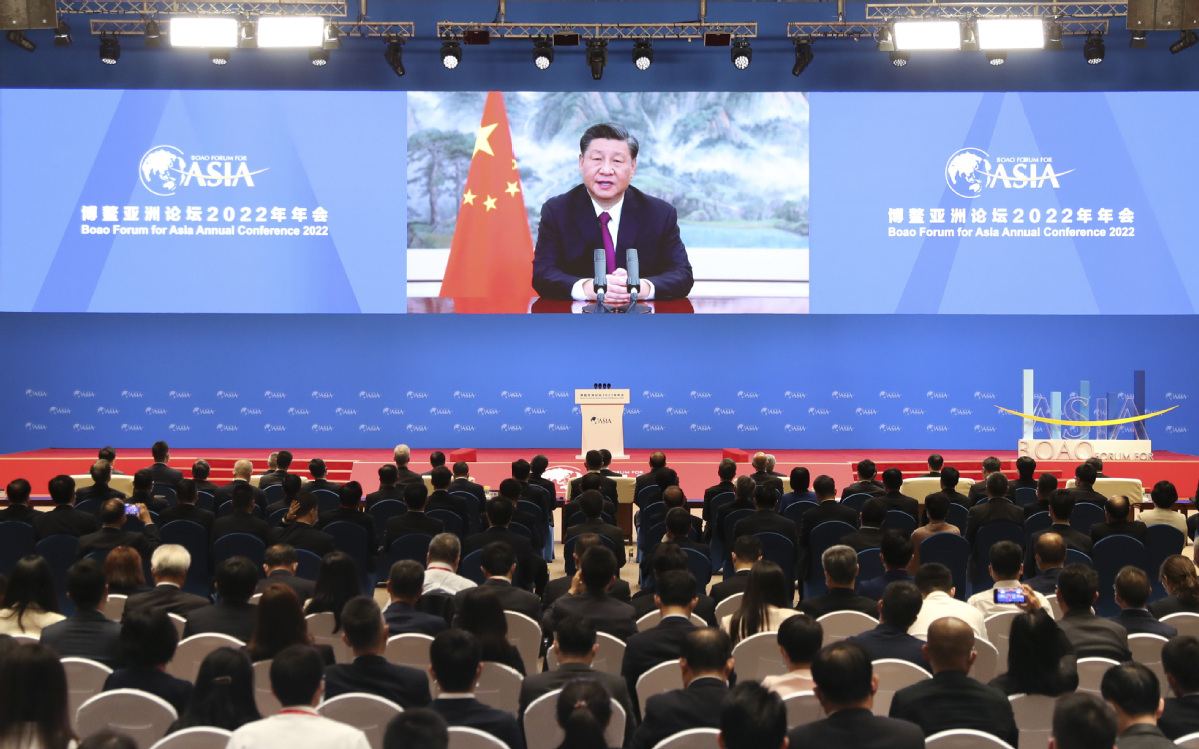
President Xi Jinping's speech calling on countries around the world to work together to tackle global governance challenges was hailed by international experts as timely and for offering calm and stability at a turbulent time in global politics.
While delivering a keynote speech via video at the opening ceremony of the Boao Forum for Asia Annual Conference 2022 on Thursday, Xi likened countries around the world to "passengers aboard the same ship who share the same destiny", noting that "for the ship to navigate the storm and sail toward a bright future, all passengers must pull together".
He also proposed a Global Security Initiative, calling on the international community to reject a Cold War mentality, oppose unilateralism and say no to group politics and bloc confrontation.
Erik Solheim, former United Nations under-secretary-general and former executive director of the UN Environment Programme, said that Xi "rightly warned about a Cold War mentality and underlined that only together can we create a shared future".
He added that Xi very appropriately called for a common platform to bring peace and lower global tensions, and called for respect for national sovereignty while avoiding unilateral action.
"His speech should help find a way toward peace in Ukraine. Even when the West and most developing nations have different perspectives, common ground should be found in the call for an immediate cease-fire, restoration of Ukraine's sovereignty and respect for legitimate Russian security concerns," he said.
Sourabh Gupta, a senior fellow at the Washington-based Institute for China-America Studies, said that Xi gave a timely speech that was calm and stabilizing during a very turbulent and destabilized time in international politics.
Gupta was impressed by the Global Security Initiative that Xi proposed, which is related to the principles that underlie the UN Charter as well as the Five Principles of Peaceful Coexistence.
"At a time when Western advanced countries are toying with the (very bad) idea of expelling or distancing Russia from international groupings such as the G20, the message correctly was that international society must come together as a group and resolve matters internally rather than forming in-groups, out-groups and excluded parties," he said.
Gupta added that he was impressed with Xi's statement that "when Asia fares well, the whole world benefits", and hence it was essential for Asia to shoulder the responsibility to serve as an anchor for world peace, he added.
Dicky Budiman, an epidemiologist at Griffith University in Australia, said he strongly agreed with Xi that global collaboration is required when it comes to dealing with global health threats or problems, and appreciated when Xi emphasized the importance of global health security.
As Asia has a large population and a huge economy, Budiman said the continent should play a key role in ensuring global health security.
"I agree with making Asia an anchor for world peace and the lead in the global community to make the world more resilient. This is an important step not only for Asia itself but also for humanity," said Budiman.
Gerald Mbanda, a Rwandan researcher and publisher on China and Africa, said that Xi's remarks on the integration of the international community and how acts to remove any single part will cause serious problems to its operation are all the more important today amid the ongoing Russia-Ukraine crisis.
He said that the call by the United States and NATO for sanctions and isolation of Russia is causing problems for the whole world with the disruption of the supply chain for essential commodities, leading to inflation and increased prices.
Yosuke Tsuyuguchi, a professor at the Department of Economics at Teikyo University in Tokyo, said China, which has a large presence in the world in terms of trade and diplomacy, has a clear and stable policy on post-COVID-19 development.
"It is of great significance and will give a certain guideline as well as a sense of stability to the entire world. In this regard, the Chinese top leader's philosophy on promoting the development of the world is very important and worth attention," Tsuyuguchi said.
Wang Xu in Tokyo, and Liu Hongjie and Chen Yingqun in Beijing contributed to this story.
President Xi Jinping delivered a keynote speech via video link at the opening ceremony of the Boao Forum for Asia Annual Conference 2022 on Thursday.
He stressed the importance of upholding a vision of common, comprehensive, cooperative and sustainable security, respecting the sovereignty and territorial integrity of all countries, and adhering to non-interference in internal affairs.
The speech won strong recognition from government officials, scholars, experts, and company executives.
Reporter: Ouyang Shijia
Photographers: Zhao Shiyue and Wang Weihan
Moderators: Ma Zhiping and Xu Kun
Subtitles: Sun Chi, Yang Yang, Chen Liubing and Zhao Tingting
Supervisors: Zhang Chunyan and Zhao Tingting

Energy integration is crucial for the world to achieve low-carbon and green development, business leaders and experts said at a sub-forum in Boao Forum for Asia, on Wednesday in Hainan province.
"The core of sustainable development lies in high-quality development, innovation and integration, and integration is of vital importance," said Song Hailiang, chairman of Energy China Group.
To address the challenge of global climate change, more than 130 countries and regions have proposed the goal of "carbon neutrality", therefore, green, low-carbon and sustainable development has already become an international goal.
Under this circumstance, the production process, technology research and service management in the energy sector are all required to be built on three dimensions - sharing, green and digital economy, which lie as the basis and the guideline for industrial development, Song highlighted.
Taking the municipal construction as an example, Song mentioned the "integration of seven networks" - a comprehensive solution that effectively integrate power, transportation, water, information, ecology, industry and culture in a city's overall management.
Liu Jizhen, an academician at the Chinese Academy of Engineering, emphasized that energy integration also means giving full play to the advantages of both traditional and new energy, making it effectively support people's life in a reliable, stable and safe way.
"New energy such as wind and solar power, although produce low carbon emission in use, are of obvious drawbacks - intermittency, volatility and inconsistency; while social energy supplies require stability, controllability and adjustability," said Xiang Haiping, chief engineer of the National Energy Administration.
Therefore, he highlighted that the process of de-carbonization cannot be simply described as "the elimination of one and the increase of the other", but deeply integrating the new and traditional power in an optimized combination pattern.
"Gradual phasing out traditional energy needs to be a long-term endeavor, and it should be based on the safe and reliable replacement of new energy", Xiang added.
In transportation and construction sectors, energy integration also nurtured great potential and development opportunities, such as hydrogen fuel-cell vehicles, roadside charging pillars and the rooftop photovoltaic.
To push forward energy integration development to a higher level, market mechanism plays a vital role, according to Xiang.
"We should make greater use of market mechanisms, to speed up the construction of green electricity market, build up an emission rights trading system and promote low-carbon consumption," he said.
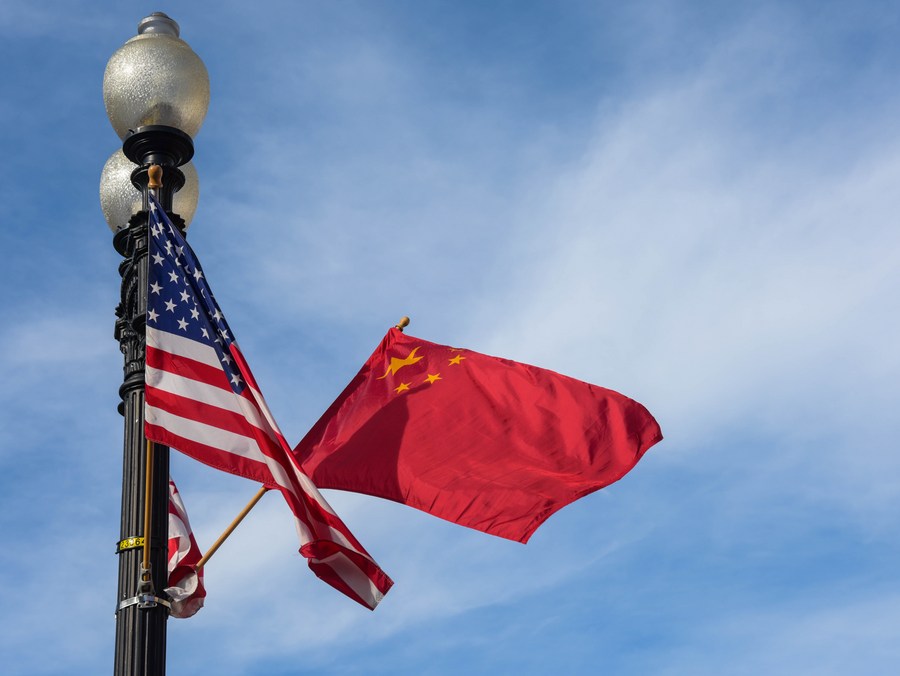
The cooperation and negotiation between the Chinese and US regulators over the audit issues for US-listed Chinese companies have been proceeding smoothly and a cooperative agreement can be achieved soon, said Fang Xinghai, vice-chairman of the China Securities Regulatory Commission on Thursday night.
Fang made such statements during the ongoing Boao Forum for Asia Annual Conference 2022. China will continue its high-level opening-up of the capital market, he said.
On one hand, continued efforts will be made to attract more foreign capital into the onshore stocks, futures and bond markets. More international leading financial institutions should be introduced to China to provide better services for investors.
There will be substantial net inflow of foreign capital into the Chinese capital market in 2022, said Fang. China's strong economic resilience, development potential, and paramount market size will lead to sustained economic growth, which will help attract more foreign capital and financial institutions, he added.
According to data from the public domain, at least 12 companies completed their initial public offering by mid April while 11 of them have seen prices falling below their IPO prices up to this date. Fang explained that companies should improve their pricing abilities. The large number of IPO cases so far this year is not the major reason for this.
The IPO prices can be set lower if the market does not show consent, said Fang.
shijing@chinadaily.com.cn
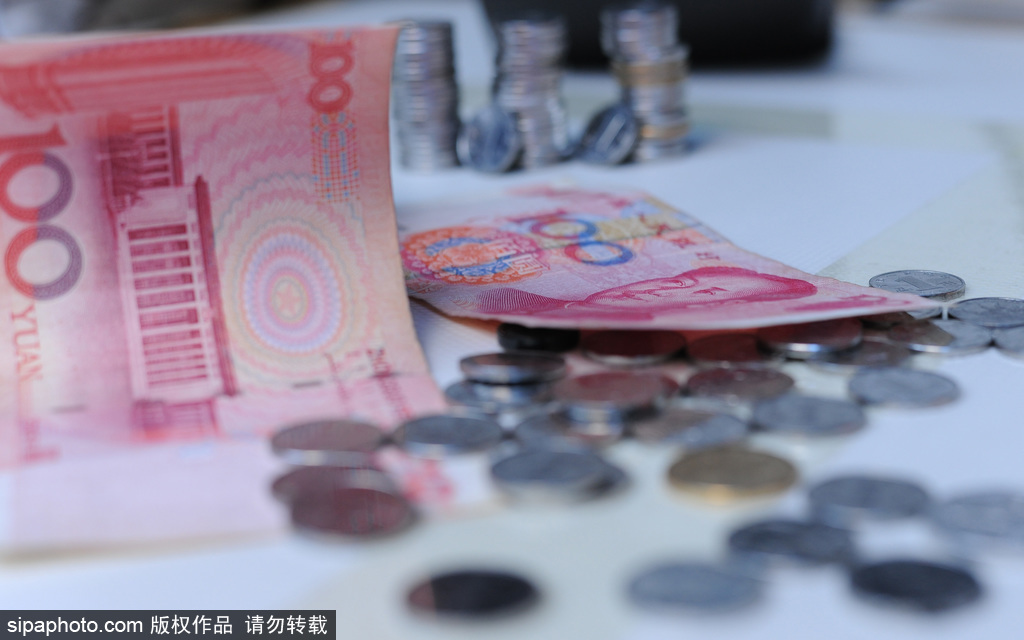
China's central bank governor Yi Gang on Friday underlined the importance of grain production and energy supply for ensuring price stability amid rising inflationary pressure worldwide.
"Price stability is our policy priority," Yi said, adding that agricultural production and the production and import of key energies - such as coal, oil and gas - are the focus of financial services.
"As long as grain production and energy supply remain stable, inflation will be kept within a reasonable range," Yi said while delivering a keynote speech at a session organized by Boao Forum for Asia Annual Conference 2022. The session was titled "Global Inflation, Interest Rate Hikes and Economic Stability".
Yi said the People's Bank of China, the nation's central bank, will maintain an accommodative monetary policy throughout this year to support the real economy and is ready to support small and medium-sized enterprises with more instruments if needed.
With monetary policy focusing on smaller businesses and vulnerable groups hit by COVID-19, the balance of inclusive lending to small and micro businesses grew 25 percent year-on-year to 21 trillion yuan ($3.25 trillion) as of the end of March, according to him.
Yi added the Carbon Emission Reduction Facility, a targeted monetary tool to support carbon reduction, had enabled the financial institutions to lend out 230 billion yuan to qualified carbon reduction programs and led to an annual reduction equivalent to over 40 million tons of carbon dioxide emission as of the end of February.
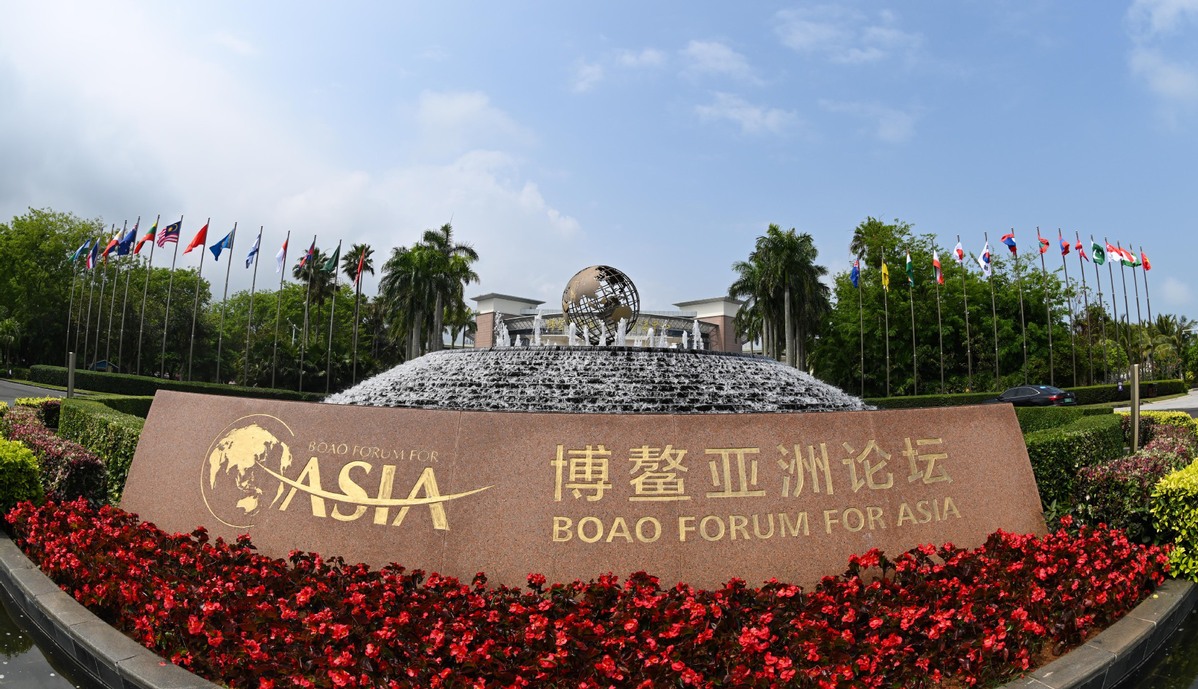
BOAO -- Chinese Vice-Premier Han Zheng on Thursday called for the Boao Forum for Asia (BFA) to actively provide "Boao plans" for regional development, and make more suggestions for pandemic response cooperation, global economic recovery and low-carbon development, among other issues.
Han, also a member of the Standing Committee of the Political Bureau of the Communist Party of China Central Committee, made the remarks when he met in South China's Hainan province with members of the BFA board of directors and representatives of the forum's strategic partners.
Han also attended the opening ceremony of BFA Annual Conference 2022 and exchanged views with representatives from the business sector.
In the face of challenges including the COVID-19 pandemic, the will to safeguard peace and security, enhance cooperation and work for common development must be strengthened, and such an aspiration must be put into action in a timely manner, Han said.
BFA Chairman Ban Ki-moon and other representatives attending the meeting expressed their willingness to play a positive role in promoting cooperation in Asia and in regional economic integration.
When he met with entrepreneurs, Han noted that China's economy is generally stable and that China is fully confident in its ability to realize sustained and sound economic development.
China will ensure the stable supply of energy and electricity this year, and continue to forge a market-oriented, law-based business environment, he said.
Entrepreneurs attending the meeting made positive comments about the Chinese government's efforts to continuously open up the country and improve its business environment, and expressed their readiness to seize opportunities in China and take further part in China's development.
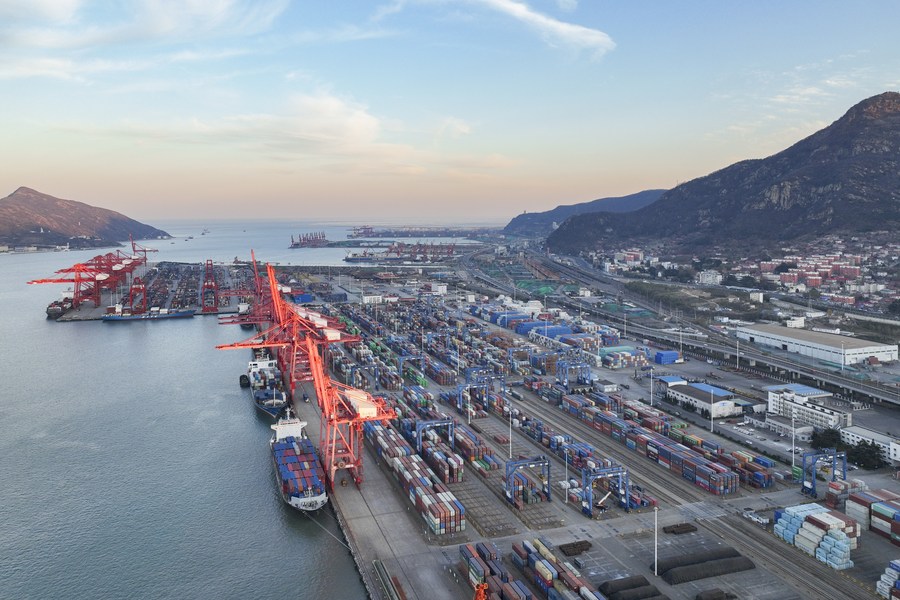
China will expand its high-standard opening-up and fully implement the negative list for foreign investment, President Xi Jinping said in a keynote speech via video link on Thursday at the opening ceremony of the Boao Forum for Asia Annual Conference 2022.
Xi said the country will expand the encouraged catalog for foreign investment, improve services for promoting foreign investment and add more cities to the comprehensive pilot program for expanding the opening-up of the service sector.
No matter how the world changes, China's faith in and its commitment to reform and opening-up will not waver, he added.
Xi said the Chinese economy enjoys strong resilience, enormous potential and vast room for maneuvering, and the country's long-term economic fundamentals remain unchanged, providing great dynamism for the stability and recovery of the world economy and broader market opportunities for all countries.
Sang Baichuan, dean of the Institute of International Economy at the University of International Business and Economics, said the keynote speech showcased China's strong commitment to expanding high-level opening-up and building an open world economy.
China is expected to further open up the service sector to the rest of the world, take a more proactive approach to align with high-standard international economic and trade rules and take more steps to optimize the business environment for foreign investors.
Sang said the coming into force of the Regional Comprehensive Economic Partnership and China's application to join the Comprehensive and Progressive Agreement for Trans-Pacific Partnership also demonstrated China's commitment to openness, which will enhance regional integration and cooperation in Asia and greatly boost the economic recovery of trade and investment.
Sang's views were echoed by Huang Yiping, deputy dean and professor of the National School of Development at Peking University, who said the Chinese economy has benefited significantly from reform and opening-up during the past few decades, and it will continue to serve as a key driving force to boost further growth.
He noted China has taken solid steps to open up its financial and service sectors to the outside world.
"As President Xi Jinping reiterated in his opening speech, China will continue to open up to the outside world at a higher level, push forward the negative list for foreign investment access… This makes AstraZeneca and other multinational companies more determined to put down roots in and cooperate with China," said Leif Johansson, chairman of multinational pharmaceutical company AstraZeneca.
Johansson highlighted China's rapid economic development over the past four decades of reform and opening-up, saying China has significantly increased its influence in Asia and on the international stage. "Despite the far-reaching global impact of the COVID-19 outbreak, the Chinese economy is back on track and has become an important stabilizer and engine for world growth.
As the largest trading partner of many countries and regions and one of the few major economies able to maintain growth despite the pandemic, China's steady economic growth will provide people with confidence in world economic growth, he added.
"As a multinational enterprise rooted in China for about 30 years, Astra-Zeneca will continue to actively grasp opportunities brought by China's continued opening-up and constantly optimized market environment, and further expand our strategic layout in the country," he said.
Samson Khaou, executive vice-president of Dassault Systemes Asia-Pacific, said Xi's keynote speech sent a signal of peace and stability to the world and gave the French software company strong confidence.
"This has also given foreign companies, including Dassault Systemes, more determination and laid a solid foundation for our firm integration into China's economic development," Khaou said.
The fact that the Boao Forum for Asia is being held as scheduled reflected China's adherence to the concept of openness, solidarity and win-win cooperation, he said.
Citing China's 4.8 percent year-on-year growth for the first quarter of the year, Khaou said it has further demonstrated the resilience and stability of the Chinese economy. "Having been rooted in China for nearly 17 years, we have witnessed the Chinese government take action to fulfill its commitment to open up at a higher level, optimize the business environment and promote business development."
With strong confidence in the Chinese market, Dassault Systemes said it will keep investing more in China to support its customers' growing needs.
In addition to Shanghai, Beijing, Guangzhou in Guangdong province and Chengdu in Sichuan province, the company said it will open a new office in Shenzhen to enhance its footprint and capabilities to work with industries in the Guangdong-Hong Kong-Macao Greater Bay Area.
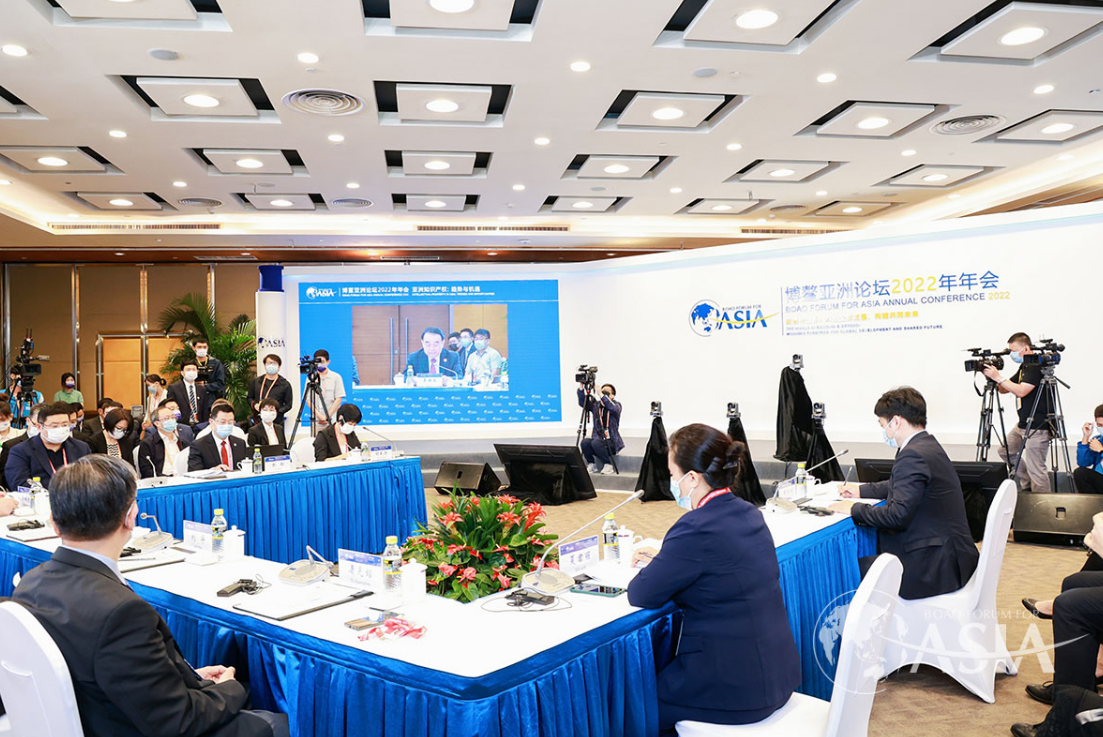
Asia has become a global powerhouse of innovation and intellectual property rights, which has given a strong boost to the world economy, said the head of the China National Intellectual Property Administration at the Boao Forum for Asia in Hainan province on Wednesday.
During the "Intellectual Property in Asia: Trends and Opportunities" sub-forum, Shen Changyu, the administration's head, highlighted that IPR, as a strategic resource for national development and enhancing international competitiveness, plays an important role in today's world.
Protecting intellectual property rights is protection of innovation, Shen said.
Li Baodong, secretary-general of the Boao Forum for Asia, said with the uncertain global economic recovery, innovation and IPR protection are important for sci-tech progress, industrial upgrading and sustainable development.
Asian economies have been making significant progress in the IPR sector in recent years, Li added, with the region emerging as a global innovation leader, providing multiple opportunities for regional and global economic development.
According to a report by the World Intellectual Property Organization, or WIPO, released last year, offices in Asia received around 2.2 million patent applications in 2020, representing 66.6 percent of the world total. In contrast, the combined figure for Europe and North America was just under the 1 million mark-less than half the total for Asia.
This was primarily driven by strong growth in filings in China, which accounted for 68.6 percent of all applications filed in the region in 2020.
WIPO's report showed that five Asian economies featured among the top 15 of the global innovation index last year, and China ranked 12th-the only middle-income economy in the top 30.
The Tokyo-Yokohama region boasted the top science and technology cluster worldwide, followed by Shenzhen-Hong Kong-Guangzhou and Beijing in the second and third spots respectively.
"At present, China's copyright industry is ushering in unprecedented historical opportunities," said Zhang Jianchun, vice-head of the Publicity Department of the Communist Party of China Central Committee.
Last September, China issued guidelines on IPR development for the 14th Five-Year Plan (2021-25) period to further optimize its IPR system in 26 key areas, including legal construction, copyright registration, international and domestic trade and social services.
In 2020, the added value of copyrights in China reached 7.51 trillion yuan ($1.17 trillion), accounting for 7.39 percent of GDP. Last year, the total number of registered copyrights reached 6.26 million, an increase of 24.3 percent year-on-year.
Copyrights for online videos, music and games have already grown into important innovative resources for the internet industry, and the market size of these exceeded 1 trillion yuan for the first time in 2020, up 23.6 percent from a year earlier.
However, Zhang said there are still various challenges in the IPR sector. The standardization of copyright protection law still needs to be improved, and there is still more that needs to be achieved for high-quality copyrights.
China is devoted to fully unleashing the capability and creativity of copyrights throughout society to drive high-quality development, Zhang said, adding that Asian countries should enhance multilateral communication and cooperation while actively building up the international copyright trading and information platform.
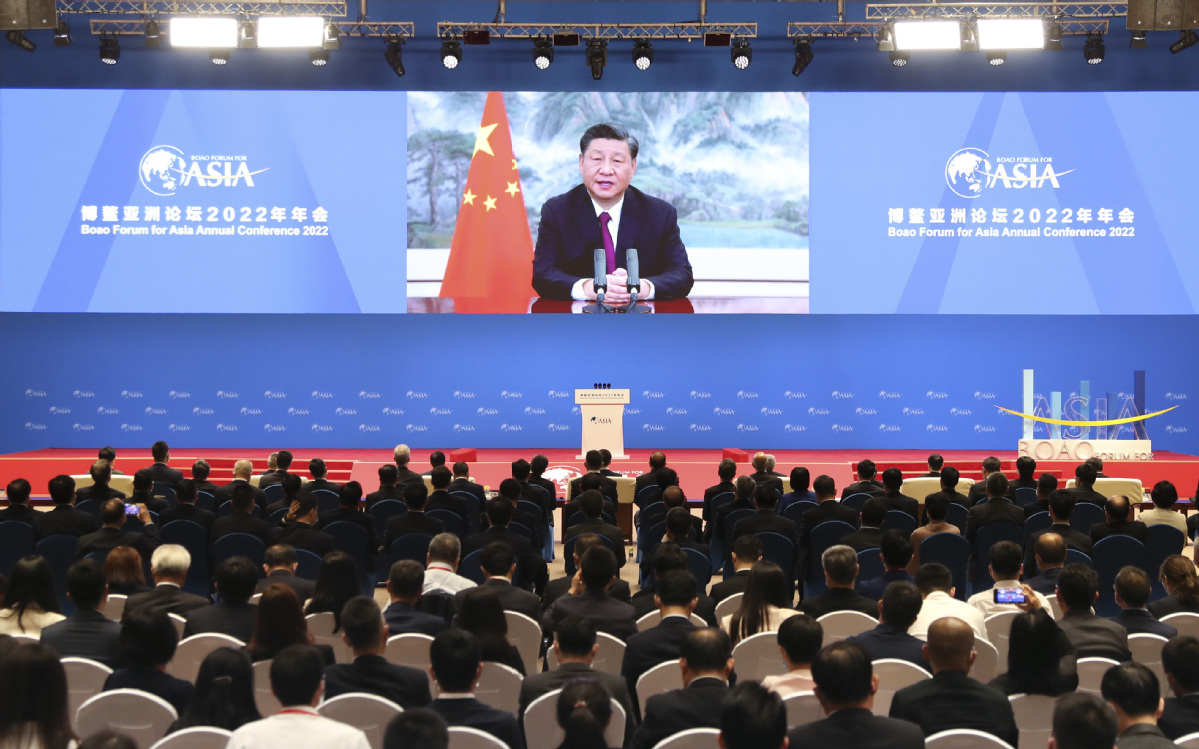
Cold War mentality would endanger world's peace, says China's top leader
President Xi Jinping proposed a Global Security Initiative on Thursday, calling on the international community to reject a Cold War mentality, oppose unilateralism and say no to group politics and bloc confrontation.
In a speech delivered via video link at the opening ceremony of the Boao Forum for Asia Annual Conference 2022, Xi stressed the importance of upholding a vision of common, comprehensive, cooperative and sustainable security, respecting the sovereignty and territorial integrity of all countries, and adhering to non-interference in internal affairs.
"It has been proven time and again that the Cold War mentality would only wreck the global peace framework, that hegemonism and power politics would only endanger world peace, and that bloc confrontation would only exacerbate security challenges in the 21st century," he told an audience of world leaders and business executives.
The forum this year brought together leaders including Israeli President Isaac Herzog, Philippine President Rodrigo Duterte and Kristalina Georgieva, managing director of the International Monetary Fund.
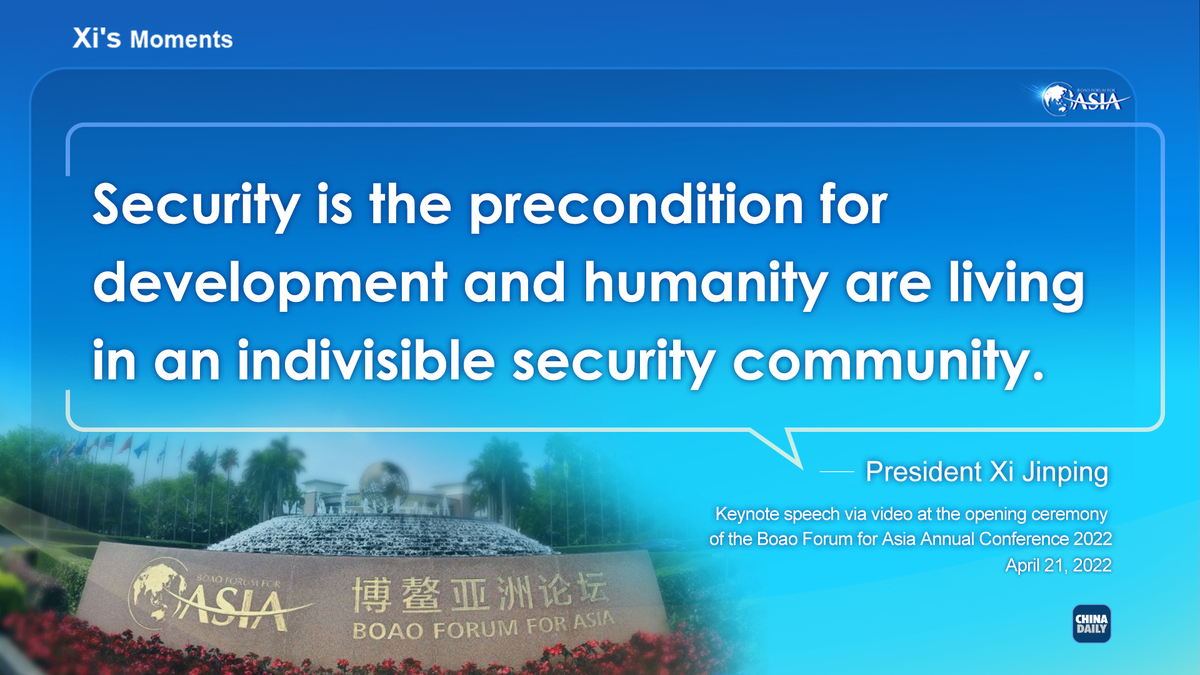
In explaining the Global Security Initiative, the president said the legitimate security concerns of all countries must be taken seriously, and a balanced, effective and sustainable security architecture should be built.
He stressed the need to oppose the pursuit of one's own security at the cost of others' security, resolve differences and disputes between countries peacefully through dialogue and consultation, and support all efforts conducive to the peaceful settlement of crises.
It is important to reject double standards, oppose the wanton use of unilateral sanctions and long-arm jurisdiction, and maintain security in both traditional and non-traditional domains, he said, adding that the international community should work together on regional disputes and global challenges such as terrorism, climate change, cybersecurity and biosecurity.
The initiative came on the heels of the Global Development Initiative, proposed by Xi at a United Nations event in September, to advance sustained global growth, economic recovery and narrow gaps between different nations.
Xi mentioned challenges including the once-in-a-century pandemic, the emergence of new traditional security risks, the weak and faltering global economic recovery, and a widening development gap in his speech on Thursday.
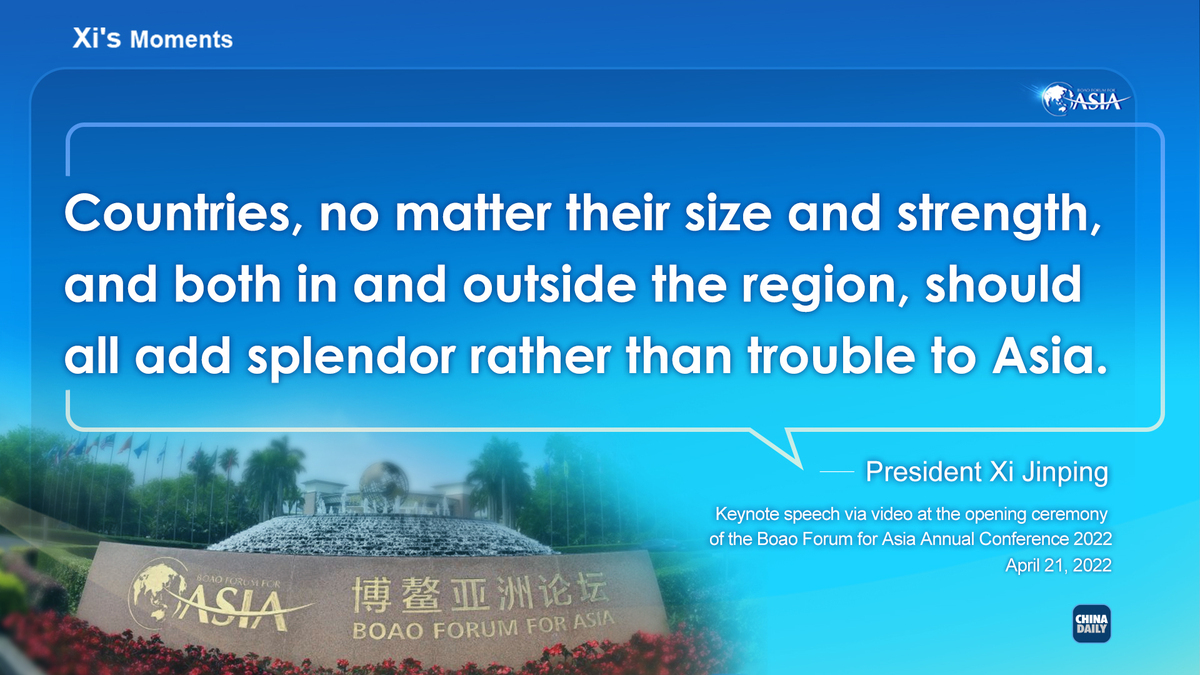
"Faced with the many challenges, we must not lose confidence, hesitate or flinch. Instead, we must firm up confidence and press ahead against all odds," Xi said.
He stressed the significance of working together to defend people's lives and health, saying that countries must support each other, better coordinate their response measures and improve global public health governance.
In promoting economic recovery, Xi underlined the need for greater macro policy coordination and to turn to science and technology for more growth drivers, keep global industrial and supply chains stable, and prevent serious negative spillovers from policy adjustments in some countries.
The international community has evolved so much that it has become a sophisticated and integrated apparatus, he said, adding that acts to remove any single part will cause serious problems to its operation.
The president expressed his disapproval of unilateralism, the excessive pursuit of self-interest, the practices of decoupling, supply disruption and maximum pressure and attempts to forge "small circles" or to stoke conflict and confrontation along ideological lines, stating that such acts are doomed to fail.
"It is particularly important for major countries to lead by example in honoring equality, cooperation, good faith and the rule of law, and act in a way befitting their status," he said.
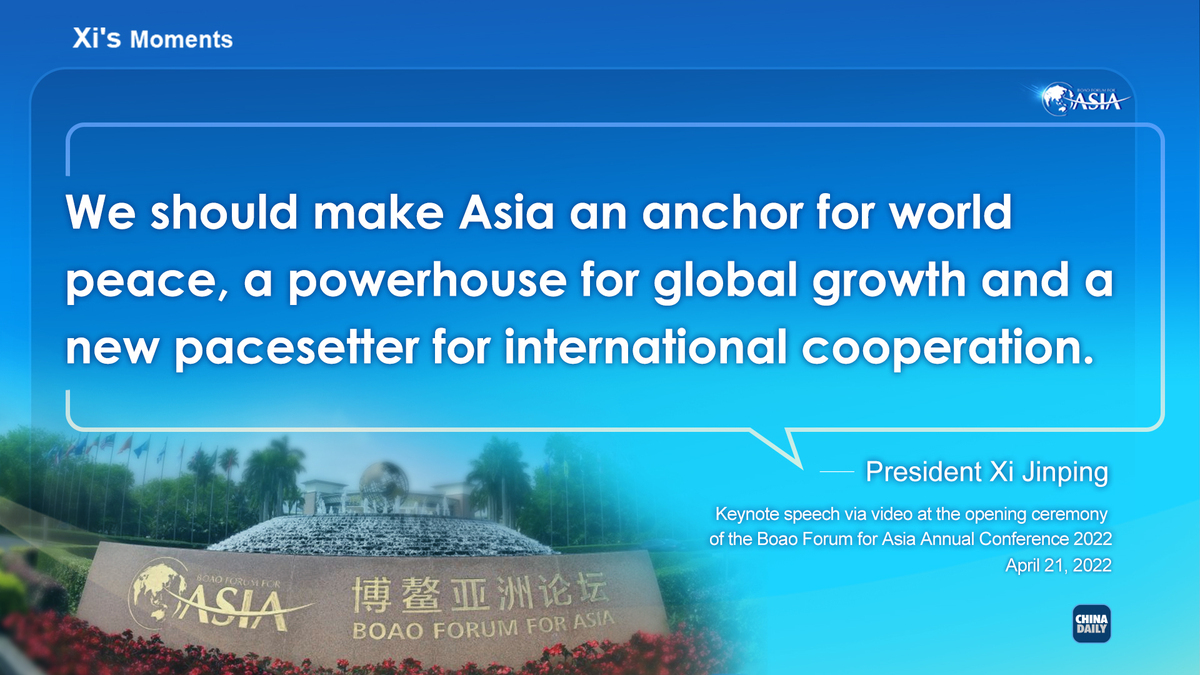
Xi called for efforts to strengthen the growth and development of Asia, saying that Asian nations should resolutely safeguard peace in the region, vigorously advance cooperation and jointly promote unity.
He underscored that the fundamentals of the Chinese economy-its strong resilience, enormous potential, vast room for maneuver and long-term sustainability-remain unchanged, and the nation's faith in and commitment to reform and opening-up will not waver.
Georgieva, the managing director of IMF, said in a prerecorded speech that China's actions to counter its slowdown and achieve its growth target are vital to global recovery.
"But the solutions for the global economy go beyond any one country. Countering the far-reaching damage of these back-to-back crises, and the risks we face in a more shock prone world, requires stronger international cooperation," she said.

Editor's note: Entitled "The World in COVID-19 & Beyond: Working Together for Global Development and Shared Future", this year's Boao Forum for Asia annual conference is underway in Boao, a coastal town in China's southern Hainan province.
Here are some of the quotes taken from speeches given the forum.
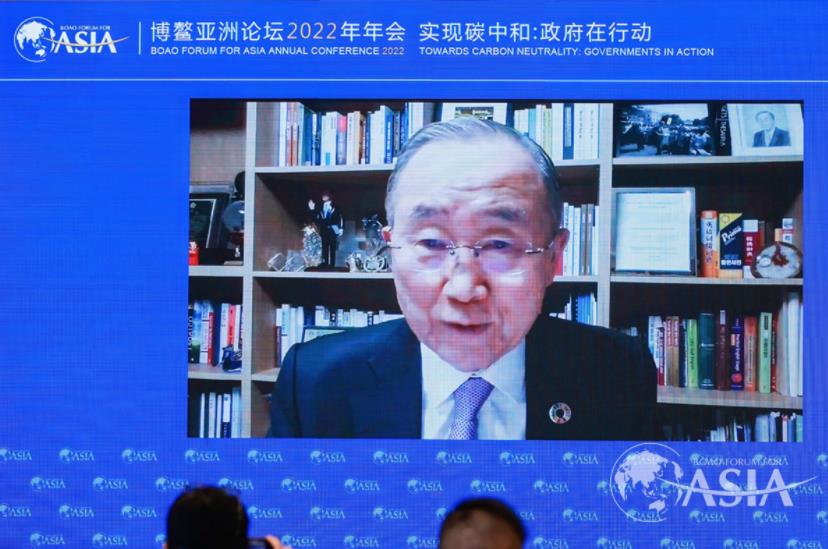
Ban Ki-moon urged the international community to take immediate action to protect the climate. Countries need to make more ambitious commitments to strengthen green action.
The 27th UN Climate Change Conference, which will be held in Egypt this year, will provide a good opportunity for countries to review carbon reduction progress and come up with stronger and more ambitious plans.
Climate justice is of prime importance. It is unfair that developing countries contribute the least to climate change, have the greatest climate risks and have the worst climate resilience.
Developed countries are obliged to provide financial and technical support to developing countries, including the pledged annual financial support of $100 billion. The United States currently has insufficient funds for climate matters.
Developed countries such as members of the European Union, the United States and Japan should firmly support developing countries, especially African countries and small islands in taking climate action.
Addressing climate issues offers all countries an opportunity for a green transition. Most countries are expected to be carbon-neutral by the middle of this century and their economic and industrial competitiveness will largely depend on how green they are. Therefore, all countries should make plans for a green transition as early as possible.
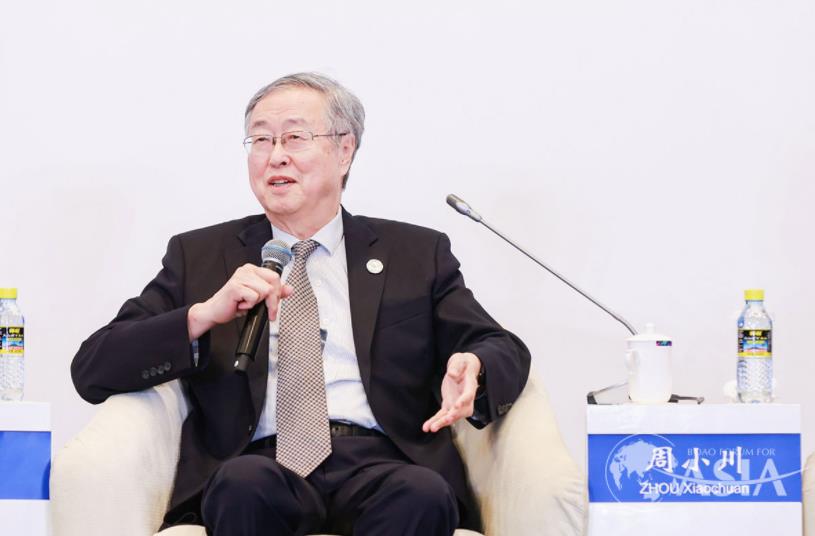
People can find the optimal incentive mechanism of carbon reduction through the development of the carbon market.
The carbon market can play an important role in optimizing resource allocation, and the combination of carbon tax and carbon trading can be considered in carbon pricing.
China is building a "1+N" policy system in order to achieve its dual carbon goal. There are two ways to decompose the goals and tasks into various departments or places.
One way is planned decomposition used in the past and the other is market-oriented and guided by carbon price.
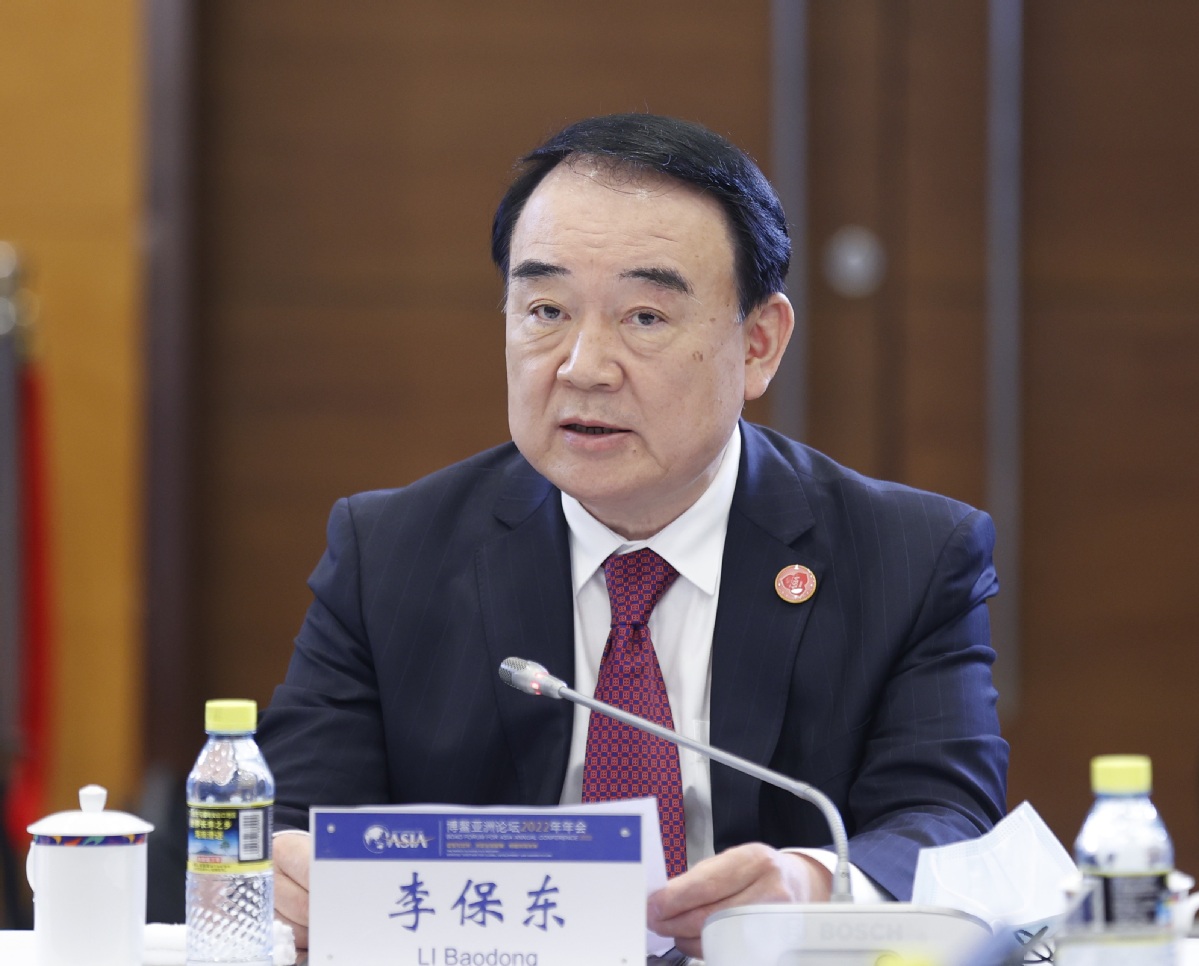
Entitled "The World in COVID-19 & Beyond: Working Together for Global Development and Shared Future", the Boao Forum for Asia Annual Conference 2022 focuses on three pressing issues the world is facing today: How to overcome the COVID-19 pandemic and build the world in the post-epidemic era, how to promote stable recovery of the world economy and achieve sustainable development and how to reduce tensions and confrontations in international relations and seek win-win cooperation.
Apart from the above issues, sub-forums and roundtable forums cover other hot topics, including green, innovative, inclusive and cooperative development.
This year's event also launched two flagship reports, the Asian Economic Outlook and Integration Progress Annual Report 2022 and Sustainable Development: Asia and the World — Asia in Action towards Green Transition.
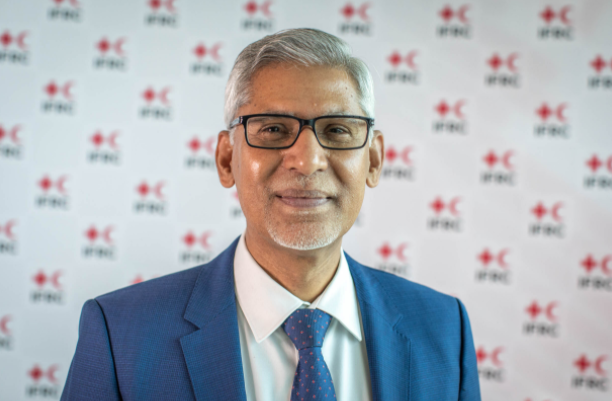
To conquer the COVID-19 pandemic requires global cooperation, and China has made great contributions, said Jagan Chapagain, secretary-general of the International Federation of Red Cross and Red Crescent Societies, at a sub-forum of the Boao Forum for Asia 2022 via video link.
To promote equality in vaccination is a pressing issue and it requires global cooperation to defeat the epidemic. China has made great contributions to promoting safe and accessible vaccines for vulnerable groups.
No one is truly safe until everyone is safe. An effective cooperation mechanism on a global scale is needed to promote vaccination and protect future generations from the COVID-19 pandemic.
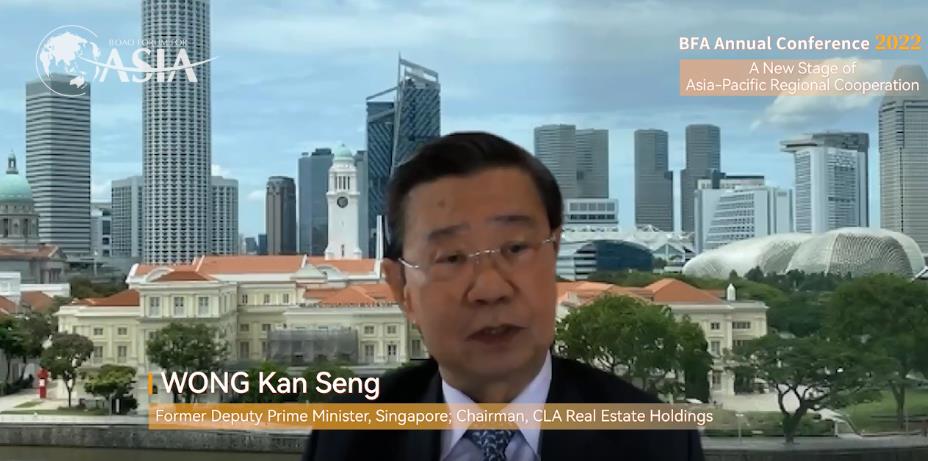
It is important for investment to continue to remain open, to be welcome and for markets to remain open as well. As regards to the CPTPP and RCEP I would say several of the Asian countries are very fortunate to be members of these two important worldwide agreements. Half of the CPTPP countries are already members of the RCEP.
If China and a few others eventually join the CPTPP as well and ensure open market access to all participants, then this expansion of the economies and the market will certainly benefit the populations in these countries.

The Asia-Pacific has been a leader, whether fighting against the negative sentiments of unilateralism, trade protectionism or economic nationalism, which have been on the rise in the West. Asia has been very steadfast, and it has now become a voice on the benefits of globalization and multilateralism.
In this backdrop, it's important to recognize Asia is not new to regional trade agreements. In fact, recent trade agreements within Asia account for almost half the total agreements for international trade.
RCEP is not going to be business as usual. It brings out the rules of origin trade in services, investment, trade facilitation, intellectual property rights, e-commerce and other cooperation.

Right now, artificial intelligence poses a very critical issue for intellectual property. And this goes in two directions. It is very important we address within the patent systems the proper protection of artificial intelligence. But it is also very important we address the issue of new patents generated by artificial intelligence and as such who owns those technologies, who are the patentees behind inventions developed by artificial intelligence.
Another critical area is crypto technologies, blockchain technology, which now seems to be developing very fast and patent officers around the world need to understand, not only are there issues concerning the protection of critical technologies, but risks and necessary safeguards. NFTs also challenged copyrights, how copyright laws can address those issues seems to be very, very critical.
When we come to the patent area, nano-technology seems to be developing every day, and they pose a serious concern, especially when we come to the discussion of the COVID pandemic, to what extent patents for pharmaceutical products concerning vaccines for COVID or medicine for COVID should be freely accessed and licensed. Although we understand the importance of access to vaccines and medicines, we have to ensure investments will flow to develop those medicines and new technologies for vaccines after COVID.
In order to ensure investments, it is important to have a strong patent system in place as well. So these are all trends internationally, and trends you see around the world and you see in China and in Asia.
The 2022 Annual Conference of the Boao Forum for Asia held under the theme of "The World in COVID-19 & Beyond: Working Together for Global Development and Shared Future" is underway in Hainan province from Wednesday to Friday.
The forum is expected to call for promoting international unity and global cooperation with a key focus on post-pandemic development and green, innovative, inclusive and collaborative development.
To know more about this year's big event, please stay tuned to China Daily!
Reporter: Ouyang Shijia
Photographer: Zhao Shiyue
Moderator: Xu Kun

